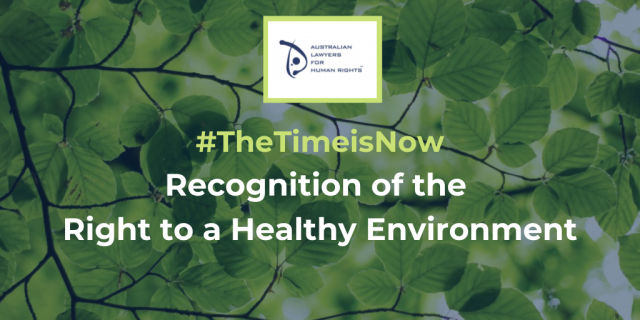Global Call to Recognise Right to Healthy Environment at UN Human Rights Council

Australian human rights experts are hopeful the next session of the United Nations Human Rights Council (UNHRC), beginning on 13 September, will see the Core Group on Human Rights and the Environment table a joint resolution to recognise the right to a healthy environment. The Core Group includes the governments of Costa Rica, the Maldives, Morocco, Slovenia and Switzerland. If tabled, the resolution will be brought to a vote by the UNHRC’s member states.
Australian Lawyers for Human Rights (ALHR) Environment and Human Rights Committee Co-Chair Fia Hamid-Walker said, “Although the Australian Government has not recognised the right to a healthy environment, 156 out of 193 UN member states have now given this right legal recognition in either constitutions, legislation or regional treaties.”
“While the UN is yet to formally recognise a stand alone right to a healthy environment, recent years have seen an ever increasing recognition of the interrelationship between human rights and environmental protection. As far back as 2010, the UN General Assembly passed a resolution recognising “the right to safe and clean drinking water and sanitation as a human right that is essential for the full enjoyment of life and all human rights.” In March 2018 the former United Nations Special Rapporteur on Human Rights and the Environment, John Knox, presented the Framework Principles to the UNHRC, setting out states’ obligations under existing core human rights treaties as they relate to the enjoyment of a safe, clean, healthy and sustainable environment.”
In June this year a joint statement during the 46th session of the UNHRC was endorsed by 69 countries supporting the belief that a safe, clean, healthy and sustainable environment is integral to the full enjoyment of human rights,”
“It is clear that there is now very significant momentum for the recognition of a stand alone human right to a healthy environment at the UN level,” Ms Hamid-Walker said.
“Such a move will fill a gap in the architecture of existing international human rights laws and have numerous important implications on what we leave to our future generations. Importantly, it would extend the obligations of all states, including Australia to recognise the reality that a healthy environment is a prerequisite for the enjoyment of everyone’s fundamental human rights.”
ALHR has joined with over 1,176 civil society organisations worldwide to call for the global recognition of the right to a healthy environment.
For all media inquiries, contact: Matt Mitchell, ALHR media manager on 0431 980 365.



